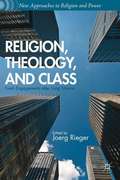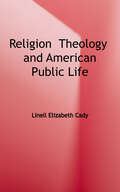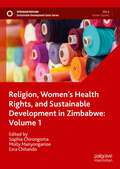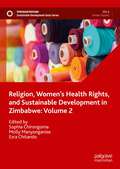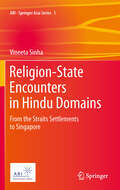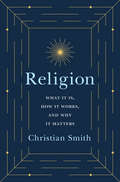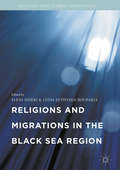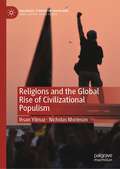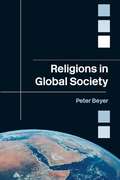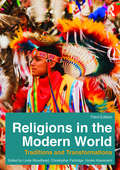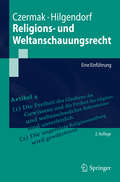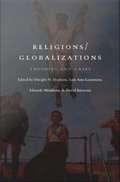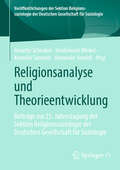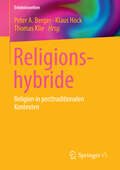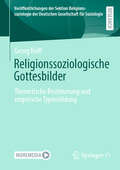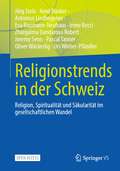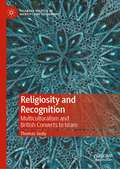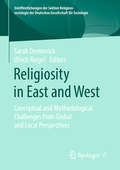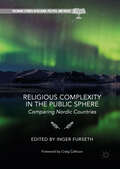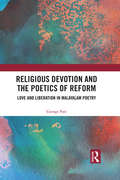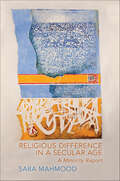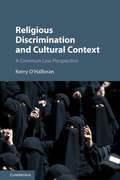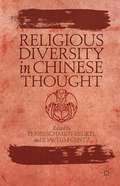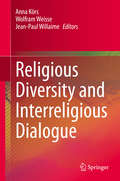- Table View
- List View
Religion, Theology, And Class
by Joerg RiegerThis important collection of essays addresses the question of why scholars can no longer do without class in religious studies and theology, and what we can learn from a renewed engagement with the topic. This volume discusses what new discourses regarding notions of gender, ethnicity, and race might add to developments on notions of class.
Religion, Theology, and American Public Life (Suny Series In Religious Studies)
by Linell Elizabeth CadyIn this book, the author analyzes the role of religion and theology in American public life.
Religion, Women’s Health Rights, and Sustainable Development in Zimbabwe: Volume 1 (Sustainable Development Goals Series)
by Ezra Chitando Sophia Chirongoma Molly ManyonganiseThis volume brings to the fore the interface of religion, women’s sexual reproductive health and rights (SRHR), and the sustainable development goals (SDGs) in Zimbabwe. It emphasizes that empowering African women is a pivotal pillar for attaining sustainable development. Contributors discuss the need for implementing structural changes as a prerequisite for social progress and development to occur in Southern Africa. They interrogate the extent to which religious beliefs and practices either promote or impede women’s SRHR. The contributors also proffer several ways in which addressing the themes of health for all and equality for all women and girls can make a meaningful contribution towards the fulfillment of the goals set for Agenda 2030.
Religion, Women’s Health Rights, and Sustainable Development in Zimbabwe: Volume 2 (Sustainable Development Goals Series)
by Ezra Chitando Sophia Chirongoma Molly ManyonganiseThis volume brings to the fore the interface of religion, women’s sexual reproductive health and rights (SRHR), and the sustainable development goals (SDGs) in Zimbabwe. It emphasizes that empowering African women is a pivotal pillar for attaining sustainable development. Contributors discuss the need for implementing structural changes as a prerequisite for social progress and development to occur in Southern Africa. They interrogate the extent to which religious beliefs and practices either promote or impede women’s SRHR. The contributors also proffer several ways in which addressing the themes of health for all and equality for all women and girls can make a meaningful contribution towards the fulfillment of the goals set for Agenda 2030.
Religion,Culture and the State
by Pierre Anctil Howard AdelmanThe Canadian principle of reasonable accommodation demands that the cultural majority make certain concessions to the needs of minority groups if these concessions will not cause 'undue hardship.' This principle has caused much debate in Quebec, particularly over issues of language, Muslim head coverings, and religious symbols such as the kirpan (traditional Sikh dagger). In 2007, Quebec Premier Jean Charest commissioned historian and sociologist Gérard Bouchard and philosopher and political scientist Charles Taylor to co-chair a commission that would investigate the limits of reasonable accommodation in that province.Religion, Culture, and the State addresses reasonable accommodation from legal, political, and anthropological perspectives. Using the 2008 Bouchard-Taylor Report as their point of departure, the contributors contextualize the English and French Canadian experiences of multiculturalism and diversity through socio-historical analysis, political philosophy, and practical comparisons to other jurisdictions. Timely and engaging, Religion, Culture, and the State is a valuable resource in the discussion of religious pluralism in Canadian society.
Religion-State Encounters in Hindu Domains
by Vineeta SinhaThe historical and empirical project presented here is grounded in a desire to theorize 'religion-state' relations in the multi-ethnic, multi-religious, secular city-state of Singapore. The core research problematic of this project has emerged out of the confluence of two domains, 'religion, law and bureaucracy' and 'religion and colonial encounters.' This work has two core objectives: one, to articulate the actual points of engagement between institutions of religion and the state, and two, to identify the various processes, mechanisms and strategies through which relations across these spheres are sustained. The thematic foundations of this book rest on disentangling the complex interactions between religious communities, individuals and the various manifestations of the Singapore state, relationships that are framed within a culture of bureaucracy. This is accomplished through a scrutiny of Hindu domains on the island nation-state, from her identity as part of the Straits Settlements to the present day. The empirical and analytical emphases of this book rest on the author's engagement with the realm of Hinduism as it is conceived, structured, framed and practiced within the context of a strong state in Singapore today. Ethnographically,the book focusses on Hindu temple management and the observance of Hindu festivals and processions, enacted within administrative and bureaucratic frames.
Religion: What It Is, How It Works, and Why It Matters
by Christian SmithA groundbreaking new theory of religionReligion remains an important influence in the world today, yet the social sciences are still not adequately equipped to understand and explain it. This book builds on recent developments in science, theory, and philosophy to advance an innovative theory of religion that goes beyond the problematic theoretical paradigms of the past.Drawing on the philosophy of critical realism and personalist social theory, Christian Smith answers key questions about the nature, powers, workings, appeal, and future of religion. He defines religion in a way that resolves myriad problems and ambiguities in past accounts, explains the kinds of causal influences religion exerts in the world, and examines the key cognitive process that makes religion possible. Smith explores why humans are religious in the first place—uniquely so as a species—and offers an account of secularization and religious innovation and persistence that breaks the logjam in which so many religion scholars have been stuck for so long.Certain to stimulate debate and inspire promising new avenues of scholarship, Religion features a wealth of illustrations and examples that help to make its concepts accessible to readers. This superbly written book brings sound theoretical thinking to a perennially thorny subject, and a new vitality and focus to its study.
Religions and Migrations in the Black Sea Region (Religion and Global Migrations)
by Eleni Sideri and Lydia Efthymia RoupakiaThis book focuses on the interconnections of religion and migration in the Black Sea region through case studies that explore shifting identities, community, and national boundaries, as well as social practices and networks. During the past few decades the Black Sea has been transformed from a largely closed region, due to the Cold War, to a bridge for human, economic, and cultural capital flows. As the region opened up, understandings and practices of religion were re-signified due to new and diverse mobilities and resettlements. This volume addresses and responds to the current scarcity of academic research on the repercussion of political reform, migration, and modernization in the areas surrounding the Black Sea. Contributors uncover and examine the pivotal role of religion in current cultural contestations taking place in this strategic region. Engaging with a wide range of case studies, the book offers a fresh, comparative examination of migration as it relates to different countries and religious groups in the region.
Religions and the Global Rise of Civilizational Populism (Palgrave Studies in Populisms)
by Ihsan Yilmaz Nicholas MoriesonThis books explores the rise of civilizational populism throughout the world, and its consequences. Civilizational populism posits that democracy ought to be based upon enacting the ‘people’s will’, yet it adds a new and troubling dimension to populism’s thin ideology: a civilization based classification of peoples and division of society. Today, we increasingly find not conflict between civilizations, but conflict within states over their civilizational identity. From Western Europe to Turkey, and from India and Pakistan to Indonesia, populists are increasingly employing a civilization based classification of peoples in order to define the identities of ‘the people’ and their perceived enemies. This book is the first to examine civilizational populism as global phenomenon rather than a uniquely Western form of politics. Through a series of case studies, the book examines the role played by religion in forming civilizational identities, but also investigates the often deleterious consequences of civilizational populism entering the political mainstream.
Religions in Global Society
by Peter BeyerPeter Beyer, a distinguished sociologist of religion, presents a way of understanding religion in a contemporary global society - by analyzing it as a dimension of the historical process of globalization. Introducing theories of globalization and showing how they can be applied to world religions, Beyer reveals the nature of the contested category of ‘religion’: what it means, what it includes and what it implies in the world today. Written with exceptional clarity and illustrated with lively and diverse examples ranging from Islam and Hinduism to African traditional religions and new age spirituality, this is a fascinating overview of how religion has developed in a globalized society. It is recommended reading for students taking courses on sociology of religion, religion and globalization, and religion and modernity.
Religions in the Modern World: Traditions and Transformations
by Linda Woodhead Christopher Partridge Hiroko KawanamiReligions in the Modern World: Traditions and Transformations, Third Edition is the ideal textbook for those coming to the study of religion for the first time, as well as for those who wish to keep up-to-date with the latest perspectives in the field. This third edition contains new and upgraded pedagogic features, including chapter summaries, key terms and definitions, and questions for reflection and discussion. The first part of the book considers the history and modern practices of the main religious traditions of the world, while the second analyzes trends from secularization to the rise of new spiritualities. Comprehensive and fully international in coverage, it is accessibly written by practicing and specialist teachers.
Religions- und Weltanschauungsrecht: Eine Einführung (Springer-Lehrbuch)
by Gerhard Czermak Eric HilgendorfDas Religions(verfassungs)recht hat angesichts der veränderten religionspolitischen Lage Konjunktur. Das Buch gibt eine kompakte Einführung in die theoretisch und praktisch wichtigsten Bereiche des Religionsrechts und greift vernachlässigte Fragen (etwa im Schulwesen oder bei der Kirchensteuer) auf. Es will überzeugen durch klare rechtliche Grundbegriffe und eine Abkehr von einer einseitig kirchenzentrierten Sichtweise. Normtexte und Rechtsprechungsübersichten runden das leserfreundliche, auch für Nichtjuristen interessante Buch ab.
Religions/Globalizations: Theories and Cases
by David Batstone Eduardo Mendieta Dwight N. Hopkins Lois Ann LorentzenFor the majority of cultures around the world, religion permeates and informs everyday rituals of survival and hope. But religion also has served as the foundation for national differences, racial conflicts, class exploitation, and gender discrimination. Indeed, religious spirituality, having been transformed by contemporary economic and political events, remains both empowering and controversial. Religions/Globalizations examines the extent to which globalization and religion are inseparable terms, bound up with each other in a number of critical and mutually revealing ways. As the contributors to this work suggest, a crucial component of globalization--the breakdown of familiar boundaries and power balances--may open a space in which religion can be deployed to help refabricate new communities. Examples of such deployments can be found in the workings of liberation theology in Latin America. In other cases, however, the operations of globalization have provided a space for strident religious nationalism and identity disputes to flourish. Is there in fact a dialectical tension between religion and globalization, a codependence and codeterminism? While religion can be seen as a globalizing force, it has also been transformed and even victimized by globalization. A provocative assessment of a contemporary phenomenon with both cultural and political dimensions, Religions/Globalizations will interest not only scholars in religious studies but also those studying Latin America, the Middle East, South Asia, and Africa. Contributors. David Batstone, Berit Bretthauer, Enrique Dussel, Dwight N. Hopkins, Mark Juergensmeyer, Lois Ann Lorentzen, Eduardo Mendieta, Vijaya Rettakudi Nagarajan, Kathryn Poethig, Lamin Sanneh, Linda E. Thomas
Religionsanalyse und Theorieentwicklung: Beiträge zur 25. Jahrestagung der Sektion Religionssoziologie der Deutschen Gesellschaft für Soziologie (Veröffentlichungen der Sektion Religionssoziologie der Deutschen Gesellschaft für Soziologie)
by Heidemarie Winkel Kornelia Sammet Alexander Yendell Annette SchnabelReligion ist ein gesellschaftliches Feld, das starken Dynamiken unterworfen ist: Religion und Religiosität reagieren sensibel auf sozialen Wandel, treiben ihn mit ihren Eigendynamiken voran oder blockieren ihn. Der vorliegende Band entstand im Anschluss an eine Tagung anlässlich des 25-jährigen Bestehens der Sektion Religionssoziologie der Deutschen Gesellschaft für Soziologie. Die Beiträge spiegeln die lebendige soziologische Forschung zu der engen Koppelung von Religion(en) und Gesellschaft und haben eine explizit feld-historische Perspektive: Sie thematisieren sowohl Veränderungen dieser Verzahnungen als auch die theoretischen und empirischen Erforschungsperspektiven und bilden die damit verbundenen aktuellen Diskurse innerhalb der deutschen Religionssoziologie ab.
Religionshybride
by Peter A. Berger Klaus Hock Thomas KliePosttraditionale Gemeinschaften tragen durch die Erschaffung ortsgebundener Utopien mit eigenen Mythen und Ritualen zur Wiederverzauberung der Welt bei, so der französische Soziologe Michel Maffesoli. An der Universität Rostock wird untersucht, inwiefern diese Gemeinschaften Ausdrucksgestalten einer Religionsproduktivität darstellen. Bilden sich über eine religionshybride Kultur neue Formen von Religion oder religiös überformte Lebensstile jenseits institutionalisierter Religionspraktiken heraus? Entgegen der revisionsbedürftigen These vom Verschwinden der Religion soll in Erfahrung gebracht werden, wie sich Religion an alten Dorfkirchen und anderen auratischen Orten möglicherweise neu und anders herausbildet. In den Blick geraten somit auch die besonderen Formen von Vergemeinschaftung und Vernetzung, Festkulturen und Events wie Hoffeste, Werthaltungen und soziale Motive.
Religionssoziologische Gottesbilder: Theoretische Bestimmung und empirische Typenbildung (Veröffentlichungen der Sektion Religionssoziologie der Deutschen Gesellschaft für Soziologie)
by Georg ReiffDieses Buch untersucht individuelle Gottesvorstellungen christlicher Gläubiger. Auf Grundlage der in einer qualitativen Interviewstudie erhobenen empirischen Daten werden individuelle Gottesbilder rekonstruiert und innerhalb einer Typologie auf ihre Wirkweise und Wirkstärke hin systematisiert. Bislang hat die religionssoziologische Theorie Religion als ein System von Glaubensüberzeugungen, Riten und Werten definiert, das sich auf einen Gott, eine höhere Macht oder eine übernatürliche Entität bezieht. Was jedoch genau unter dieser zentralen Glaubenskategorie verstanden wird bzw. wie die Gläubigen selbst diesen intimen Bezugspunkt des eigenen Glaubens definieren, war bislang noch nicht Bestandteil der Debatte. Das Gottesbild als neues theoretisches Konstrukt wird daher in diesem Buch in die religionssoziologische Theoriedebatte eingeführt. Es wird hierbei theoretisch innerhalb von Religion verortet, seine individuelle Entstehung nachskizziert und typologisiert.
Religionstrends in der Schweiz: Religion, Spiritualität und Säkularität im gesellschaftlichen Wandel
by Irene Becci Jörg Stolz Antonius Liedhegener Oliver Wäckerlig Arnd Bünker Eva Baumann-Neuhaus Zhargalma Dandarova Robert Jeremy Senn Pascal Tanner Urs Winter-PfändlerDiese Open-Access-Publikation beschreibt gegenwärtige Entwicklungen in der Religionslandschaft der Schweiz. Sie führt eine Reihe von Studien fort, die seit den 1980er Jahren in regelmässigen Zeitabständen publiziert werden. Die hier versammelten Beiträge basieren auf der Auswertung aktueller statistischer Daten und bearbeiten Fragestellungen aus der Religions- und Kirchensoziologie sowie aus der Politikwissenschaft.
Religiosity and Recognition: Multiculturalism and British Converts to Islam (Palgrave Politics of Identity and Citizenship Series)
by Thomas SealyThis book argues that multiculturalism remains a relevant and vital framework through which to understand and construct inclusive forms of citizenship. Responding to contemporary ethnic and religious diversity in European states and the position of religious minorities, debates in multiculturalism have revitalized discussion of the public role of religion, yet multiculturalism has been increasingly challenged in both political as well as academic circles. With a focus on Britain and through a study of the narratives of British converts to Islam, this book engages in debates centered around multiculturalism, particularly on the issues of identity, recognition, and difference. Yet, it also identifies and interrogates multiculturalism’s shortcomings in relation to specifically religious identities and belonging. In a unique and innovative analysis, this book combines a discussion of multiculturalism in Britain with insights from political theology. It juxtaposes multiculturalism’s concepts of ethno-religious identity and recognition with the notions of religiosity and hospitality to offer a new perspective on religious identity and the implications of this for thinking with and about multiculturalism and multicultural social and political relations.
Religiosity in East and West: Conceptual and Methodological Challenges from Global and Local Perspectives (Veröffentlichungen der Sektion Religionssoziologie der Deutschen Gesellschaft für Soziologie)
by Sarah Demmrich Ulrich RiegelThe book discusses the theoretical and methodological challenges of an interculturally valid sociology of religion and provides insights into the autochthonous socio-religious research in Muslim societies and Asian countries. In this way, it links discourses that have so far taken place primarily independently of one another. The book goes back to a conference in Münster that questioned the Western foundation of empirical religiosity research, which reaches its limits in the non-American and non-European context, but also with regard to orthodox forms of faith in the Western context.
Religious Complexity in the Public Sphere
by Inger FursethThis book is an empirical comparative study of the complexity of religion in the public spheres of the five Nordic countries. The result of a five-year collaborative research project, the work examines how increasingly religiously diverse Nordic societies regulate, debate, and negotiate religion in the state, the polity, the media, and civil society. The project finds that there are seemingly contradictory religious trends at different social levels: a growing secularization at the individual level, and a deprivatization of religion in politics, the media, and civil society. It offers a critique of the current theories of secularization and the return of religion, introducing religious complexity as an alternative concept to understand these paradoxes. This book is for scholars, students, and readers with an interest in understanding the public role of religion in the West.
Religious Devotion and the Poetics of Reform: Love and Liberation in Malayalam Poetry
by George PatiThe poetry emanating from the bhakti tradition of devotional love in India has been both a religious expression and a form of resistance to hierarchies of caste, gender, and colonialism. Some scholars have read this art form through the lens of resistance and reform, but others have responded that imposing an interpretive framework on these poems fails to appreciate their authentic expressions of devotion. This book argues that these declarations of love and piety can simultaneously represent efforts towards emancipation at the spiritual, political, and social level. This book, through a close study of Naḷini (1911), a Malayalam lyric poem, as well as other poems, authored by Mahākavi Kumāran Āśān (1873–1924), a low-caste Kerala poet, demonstrates how Āśān employed a theme of love among humans during the modern period in Kerala that was grounded in the native South Indian bhakti understanding of love of the deity. Āśān believed that personal religious freedom comes from devotion to the deity, and that love for humans must emanate from love of the deity. In showing how devotional religious expression also served as a resistance movement, this study provides new perspective on an understudied area of the colonial period. Bringing to light an under-explored medium, in both religious and artistic terms, this book will be of great interest to scholars of religious studies, Hindu studies, and religion and literature, as well as academics with an interest in Indian culture.
Religious Difference in a Secular Age: A Minority Report
by Saba MahmoodHow secular governance in the Middle East is making life worse—not better—for religious minoritiesThe plight of religious minorities in the Middle East is often attributed to the failure of secularism to take root in the region. Religious Difference in a Secular Age challenges this assessment by examining four cornerstones of secularism—political and civil equality, minority rights, religious freedom, and the legal separation of private and public domains.Drawing on her extensive fieldwork in Egypt with Coptic Orthodox Christians and Bahais—religious minorities in a predominantly Muslim country—Saba Mahmood shows how modern secular governance has exacerbated religious tensions and inequalities rather than reduced them. Tracing the historical career of secular legal concepts in the colonial and postcolonial Middle East, she explores how contradictions at the very heart of political secularism have aggravated and amplified existing forms of Islamic hierarchy, bringing minority relations in Egypt to a new historical impasse. Through a close examination of Egyptian court cases and constitutional debates about minority rights, conflicts around family law, and controversies over freedom of expression, Mahmood invites us to reflect on the entwined histories of secularism in the Middle East and Europe.A provocative work of scholarship, Religious Difference in a Secular Age challenges us to rethink the promise and limits of the secular ideal of religious equality.
Religious Discrimination and Cultural Context: A Common Law Perspective
by Kerry O'HalloranGenerations of festering culture wars, compounded by actual wars in predominantly Muslim countries, the terrorism of Isis, and the ongoing migrant crisis have all combined to make religious discrimination the most pressing challenge now facing many governments. For the leading common law nations, with their shared Christian cultural heritage balanced by a growing secularism, the threat presented by this toxic mix has the potential to destabilise civil society. This book suggests that the instances of religious discrimination, as currently legally defined, are constrained by that cultural context, exacerbated by a policy of multiculturalism, and in practice, conflated with racial, ethnic or other forms of discrimination. Kerry O'Halloran argues that many culture war issues - such as those that surround the pro-choice/pro-life debate and the rights of the LGBT community - can be viewed as rooted in the same Christian morality that underpins the law relating to religious discrimination. Suggests that present forms of religious discrimination are shaped by past cultural traditions. Demonstrates how many culture war issues - such as abortion and gay marriage - are forms of religious discrimination. Provides a comparative analysis of religious discrimination case law which shows how judicial treatment of matters such as accommodating religious belief in the workplace varies on a jurisdictional basis.
Religious Diversity In Chinese Thought
by Perry Schmidt-Leukel Joachim GentzThis collection of essays by major scholars analyze the religious diversity in Chinese religion, bringing together topics from traditional and contemporary contexts and Chinese religions' encounters with Western religion.
Religious Diversity and Interreligious Dialogue
by Anna Körs Wolfram Weisse Jean-Paul WillaimeThis edited volume offers solutions on the challenges of religious pluralisation from a European perspective. It gives special attention to interreligious dialogue and interfaith relations as specific means of dealing with plurality. In particular, the contributors describe innovative scientific approaches and broad political and social scopes of action for addressing the diversity of beliefs, practices, and traditions. In total, more than 25 essays bring together interdisciplinary and international research perspectives. The papers cover a wide thematic range. They highlight how religious pluralisation effects such fields as theology, politics, civil society, education, and communication/media. The contributors not only illustrate academic debates about religious diversity but they also look at the political and social scope for dealing with such. Coverage spans numerous countries, and beliefs, from Buddhism to Judaism. This book features presentations from the Herrenhausen Conference on "Religious Pluralisation - A Challenge for Modern Societies," held in Hanover, Germany, October 2016. This insightful collection will benefit students and researchers with an interest in religion and laicism, interreligious dialogue, governance of religious diversity, and religion in the public sphere.
